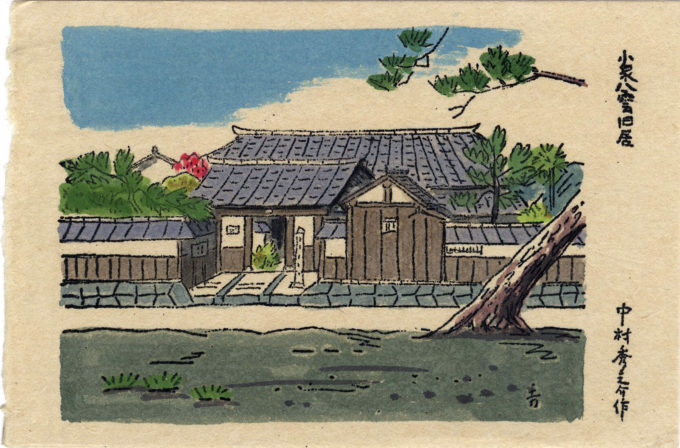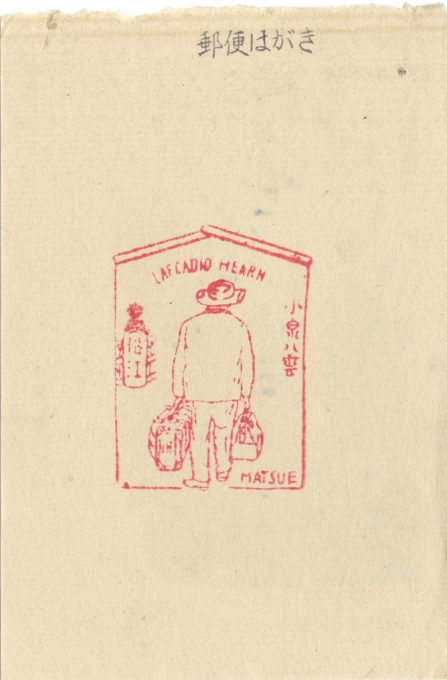
Lafcadio Hearn’s home, Matsue, Shimane Prefecture, Japan, c. 1950. Writer Lafcadio Hearn (Koizumi Yakumo) lived in Matsue from 1890-1891, his first home in Japan. His house there is now a museum and a popular tourist attraction. As Matsue’s “favorite son,” there are monuments and landmarks honoring Hearn throughout the city: such as Herun-no-komichi (Hearn Lane), Shimane Breweries Limited Beer Hearn (a craft beer), Karakoro Art Studio, and a park called Karakoro-hiroba. The words Herun and Karakoro [trans. “clip clop”, what geta sound like], which have an amusing ring to Japanese ears, are references to Hearn.
“At the end of the nineteenth century, Lafcadio Hearn was one of America’s best-known writers, one of a stellar company that included Mark Twain, Edgar Allan Poe, and Robert Louis Stevenson.
“Twain, Poe, and Stevenson have entered the established literary canon and are still read for duty and pleasure. Lafcadio Hearn has been forgotten, with two remarkable exceptions: in Louisiana and in Japan.
“Yet Hearn’s place in the canon is significant for many reasons, not least of which is how the twentieth century came to view the nineteenth. This view, both academic and popular, reflects the triumph of a certain futuristic Modernism over the mysteries of religion, folklore, and what was once called ‘folk wisdom.’ To witness this phenomenon in time-lapse, sped-up motion, one need only consider Lafcadio Hearn, the Greek-born, Irish-raised, New World immigrant who metamorphosed from a celebrated fin-de-siècle American writer into the beloved Japanese cultural icon Koizumi Yakumo in less than a decade, in roughly the same time that Japan changed from a millennia-old feudal society into a great industrial power.
“… Lafcadio Hearn’s lives are a fairy tale true in various tellings, primarily his own, then those of his correspondents, and with greater uncertainty, those of his biographers. Hearn changed, as if magically, from one person into another, from a Greek islander into a British student, from a penniless London street ragamuffin into a respected American newspaper writer, from a journalist into a novelist, and, most astonishingly, from a stateless Western man into a loyal Japanese citizen. His sheer number of guises make him a creature of legend.
“… In February 1896, Lafcadio Hearn became the Japanese citizen Yakumo Koizumi. Adopted by his Japanese family as a condition for citizenship, he took the family name Koizumi, meaning ‘little spring,’ and chose for his own name Yakumo, meaning ‘eight clouds,’ which was the first word of the ‘most ancient poem extant in the Japanese language,’ as well as one of the names for Izumo, ‘my beloved province, the place of the Issuing of the Clouds.’
“… Hearn set himself to the task of studying and translating haiku and tanka, forms of Japanese poetry that made brevity their virtue. Poetry for every occasion, composed spontaneously, solemn or raucous, was part of Japanese life, and a delight for all ages. Folk poetry, the recitation of epics, provided the threads that Hearn seized on when he wrote Kwaidan, his first truly Japanese book written in his best English. It was published in 1904, the year of his death … Distilled here are Hearn’s efforts to find the forms best suited to his multifaceted personalities: his own masks are to be found here, discarded, haunting, or preserved.
“Kwaidan achieved what Hearn intended to find in Japanese culture: a flowing mix of folktales, personal observations, and a marvelous series of essays on insects—it is the work of Hearn-Koizumi, a writer with a double vision, an English-language writer deeply intimate with Japan, or a Japanese storyteller consciously writing in English.”
– “The Many Lives of Lafcadio Hearn”, by Andrei Codrescu, The Paris Review, July 2, 2019


